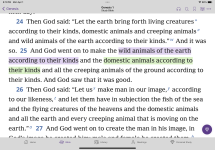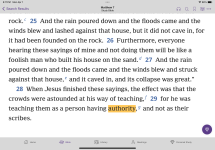I'm starting this thread to put down my thoughts on the Bible's role in the life of faith. As Christians we take it for granted that the Bible is authoritative. In fact, all branches of Christianity—Roman Catholicism, Eastern Orthodoxy, and Protestantism with all its diverse denominations—to various degrees agree that the Bible is indispensable to the Christian faith. The Bible is the word of God, we affirm. However, it's obvious that there are disagreements about just how the Bible is authoritative.
This is a topic I've been wrestling with for a few years now. Due to a crisis of faith, I began to question the Bible's authority—or, more accurately, my understanding of the Bible's authority. How do I reconcile the Bible with scientific discoveries without compromising one or the other? Do scientific discoveries call into question the authority of the Bible? Can I believe, for example, in biological evolution of life on earth and still remain faithful to the Bible?
What about historical-critical studies—textual criticism, form & genre criticism, literary criticism, redaction criticism (the history of the biblical tradition)—of the Bible? I want to take the findings of historical-critical scholarship seriously. But would that undermine the Bible's authority?
In wrestling with these questions, I've tried to avoid two extremes: fundamentalism and the surrender of biblical authority.
What fuels fundamentalism is “the lust for certainty and security. It is the certainty that God has spoken in particular words and formulations which are clear-cut and fixed for all time, which alone gives the fundamentalist the security (s)he craves for.” Such certainty is impossible when it comes to the Bible because “mere words are never adequate to express the whole truth of God”. Moreover, the craving for certainty “undermines the faith and trust [in God] that is the mark of the truly religious, who walk by faith and not by sight.” (James D. G. Dunn, The Living Word: Second Edition, pp. vii, viii)
The person who surrenders the Bible's authority, like the fundamentalist, craves for certainty. But, unlike the fundamentalist, (s)he throws the Bible away because it fails to meet his/her need for security and certainty.
So now my goal is to re-affirm the Bible's authority while holding together everything else I've learned and continue to learn from science and biblical scholarship. All truth comes from God. Science, to the extent that it approximates the truth, cannot be in opposition to God's truth. The same goes for all fields of human endeavour. As we used to say as Jehovah's Witnesses, “the truth is one.” I'm done trying to pit the sciences against faith and the Bible. I want to think more holistically about these things. For me now it's both/and, not either/or: NOT either science/history/archaeology, etc. or faith/scripture, but both science/history/archaeology, etc. and faith/scripture; because both science and faith are important, both have their place in the life of faith.This is a topic I've been wrestling with for a few years now. Due to a crisis of faith, I began to question the Bible's authority—or, more accurately, my understanding of the Bible's authority. How do I reconcile the Bible with scientific discoveries without compromising one or the other? Do scientific discoveries call into question the authority of the Bible? Can I believe, for example, in biological evolution of life on earth and still remain faithful to the Bible?
What about historical-critical studies—textual criticism, form & genre criticism, literary criticism, redaction criticism (the history of the biblical tradition)—of the Bible? I want to take the findings of historical-critical scholarship seriously. But would that undermine the Bible's authority?
In wrestling with these questions, I've tried to avoid two extremes: fundamentalism and the surrender of biblical authority.
What fuels fundamentalism is “the lust for certainty and security. It is the certainty that God has spoken in particular words and formulations which are clear-cut and fixed for all time, which alone gives the fundamentalist the security (s)he craves for.” Such certainty is impossible when it comes to the Bible because “mere words are never adequate to express the whole truth of God”. Moreover, the craving for certainty “undermines the faith and trust [in God] that is the mark of the truly religious, who walk by faith and not by sight.” (James D. G. Dunn, The Living Word: Second Edition, pp. vii, viii)
The person who surrenders the Bible's authority, like the fundamentalist, craves for certainty. But, unlike the fundamentalist, (s)he throws the Bible away because it fails to meet his/her need for security and certainty.
I'll have more to say on this later.



